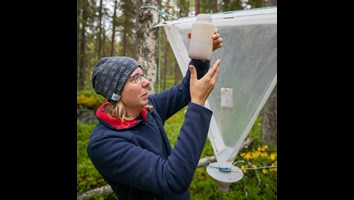Department of Forest Mycology and Plant Pathology

Bolivian students dive into the world of bioinformatics
How do you identify an organism at the molecular level – and how can that contribute to sustainable agriculture? These were some of the questions explored by Bolivian students during an international
Facing Climate Risks in Agriculture and Forestry in Northern Europe
Facing Climate Risks in Agriculture and Forestry in Northern Europe markmikjo-webb@slu.se Climate change is already affecting agriculture and forestry across Northern Europe, but the impacts, risks

Healthy forests in a changing climate – the path to resilient conifers
In her doctoral thesis, Matilda Stein Åslund has studied genetic and environmental factors that affect diseases in conifers. This is an important step toward preserving our forests in the ongoing
Dissertation Matilda Stein Åslund
Factors contributing to disease phenotypes in conifers charlotta.bergstrom@slu.se Matilda Stein Åslund defends her thesis "Factors contributing to disease phenotypes in conifers" on May 23 2025.
Diss Sidhant Chaudhary
Plant genotype-dependent biocontrol of wheat diseases charlotta.eriksson@slu.se SidhantChaudhary defends his thesis "Plant genotype-dependent biocontrol of wheat diseases" on 09th of May 2025 All

Plant genotype-dependent biocontrol of wheat diseases
Genetic variation in plants can affect how efficiently biological control agents can reduce diseases. In this doctoral thesis, Sidhant Chaudhary has investigated this variation to bring us closer to

10 new research partnerships to advance sustainable forest management granted
Ten doctoral projects have been granted within WIFORCE – Wallenberg Initiatives in Forest Research program at SLU. The projects are conducted in collaboration with private and public partners and aim
Interdisciplinary insights into navigating the maze of landscape multifunctionality
Interdisciplinary insights into navigating the maze of landscape multifunctionality futurefood@slu.se Welcome to a new inspirational lunch webinar about interdisciplinarity! In this webinar a

Vahideh gets award for her work on improving food security
Vahideh Rafieebanadaki has been recognized as an honorary member of the Jeanie Borlaug Laube Women in Triticum award by the Borlaug Global Rust Initiative for her contributions to wheat research and
Re-launch of Skogsskada
Re-launch of Skogsskada theres.svensson@slu.se We would like to present the new version of Skogsskada, a web-based tool for reporting and identifying forest damage. After intensive work to rebuild

Forest of the future in focus – 14 PhD students link research and application
Fourteen phd-projects will be realised in a collaboration between SLU and forestry operators. They will be part of a new research programme for sustainable forestry and on Monday SLU researchers

Gene-silencing spray to combat cereal disease is safe for the environment
Great hopes are placed on a new way to combat plant diseases, using RNA to turn off genes that the pathogen needs to initiate the attack. Now, researchers from SLU and the James Hutton Institute have
